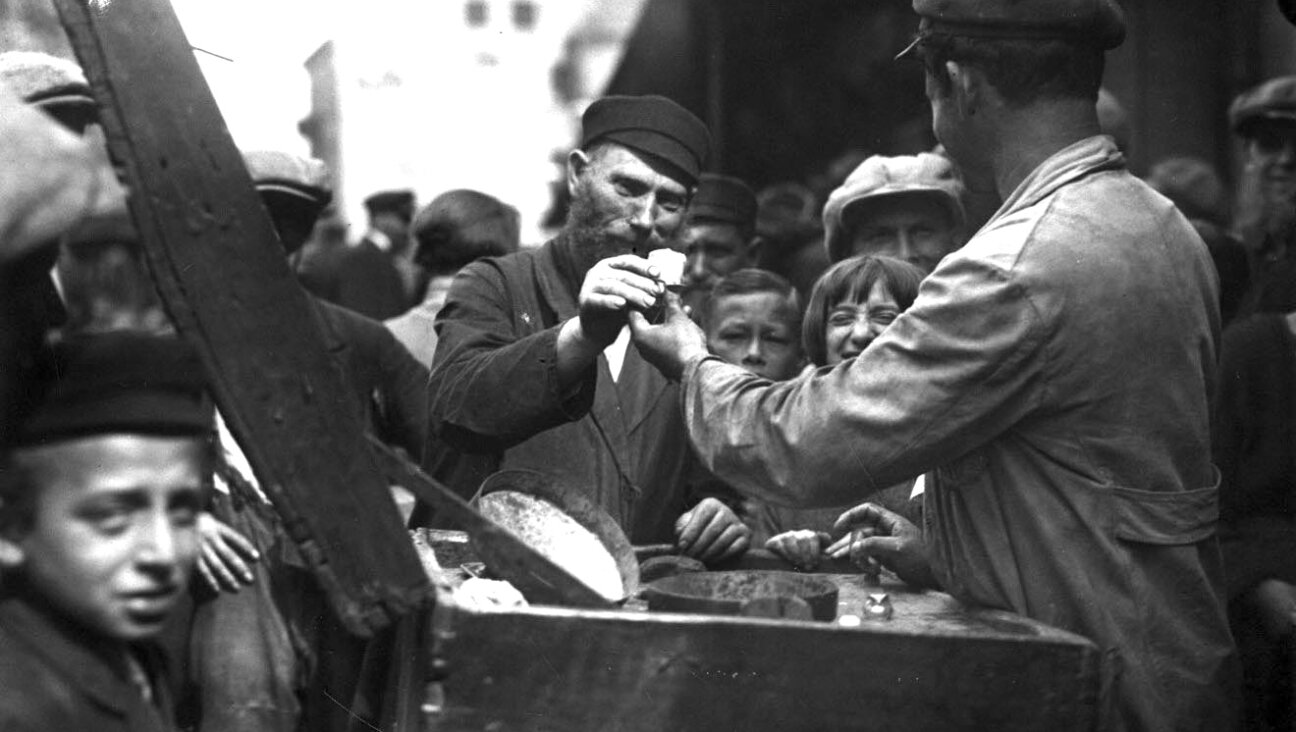Photographer Sinks His Teeth Into Israeli Food Scene

Image by Courtesy of Gibbs Smith
Steven Rothfeld flips through his new book and stops on a page showing a focaccia with pieces of charred cauliflower dappling its surface.
“This is one of the best things I’ve ever eaten in my life,” he says.
Then he stops on a page showing a deep-orange kumquat marmalade.
“This is one of the best things I’ve ever eaten in my life,” he repeats.
As he flips through “Israel Eats,” he utters that phrase numerous times, which he can get away with because he is the book’s photographer and writer — not the chef who prepared the dishes or created the recipes.
Related
Taste Testing ‘Israel Eats’
Spinach and Feta Arayes
Date Honey and Tahini Semifreddi With Cashew Brittle
While the St. Helena, California-based photographer has taken pictures for numerous cookbooks — such as “Bringing Tuscany Home,” “Dean & DeLuca: The Food and Wine Cookbook” and Michael Chiarello’s “Napa Stories” — “Israel Eats” is the first book he’s also written.
Renowned L.A.-based chef Nancy Silverton, who featured Rothfeld photos in three of her own cookbooks, wrote the introduction and contributed 10 recipes to the 240-page hardcover book, which was published last month. Raised in Sherman Oaks in a “very Reform” family, Rothfeld decided in high school that he would attend U.C. Berkeley or not attend college at all. By his junior year, he decided he wanted to take a leave of absence to travel, which prompted his father to say “your life will be ruined,” and his mother to say “let him go.”
He bought a one-way airplane ticket and traveled throughout Europe, resolving to find a career that would include as much travel as possible. Rothfeld had always loved photography, and even in high school, a teacher recognized his talent and encouraged him to pursue it.
“Though I loved to read and write, photography was a very natural form of expression for me,” he said.

Image by Courtesy of Gibbs Smith
After attending the ArtCenter College of Design in Pasadena, Rothfeld soon began specializing in food and travel, and his career took him repeatedly to France and Italy. When he and his wife were ready to leave L.A., they chose the Napa Valley because it felt like Europe, and that proved to be fertile ground as well, as Rothfeld regularly works with many of the regional restaurants and wineries.
For years, an art school friend told Rothfeld he was a bad Jew for never having visited Israel, so when he was in Italy waiting for the olive harvest, he decided it was finally time. He was in his mid-50s.
In an interview for this piece, Rothfeld spoke with all the zeal of the newly converted, describing how he felt at home right away and how, at one point, he was overcome with emotion, struck by what it meant that the Jewish people had a country of their own.
And, of course, he ate his way through the country. Looking through his photos when he got home, he realized most of them were of food.
He called Silverton and asked if she would accompany him to Israel to investigate the culinary scene and perhaps collaborate on a book with him. She laughed.
She hadn’t been since she was a teen, but it was a different time then. It was right after the Six-Day War in 1967, and Israel’s cuisine was not what is today (to put it politely).
While Rothfeld wanted to do this book before the popularity of Yotam Ottolenghi and Sami Tamimi’s 2012 bestseller “Jerusalem: A Cookbook,” it may have been that very book that persuaded Silverton to go.
What she found during her travels with Rothfeld astonished her.
“Before this trip, I would never have thought of Israel as a food destination,” she writes in the introduction. “Now the best food I’ve ever had on vacation was on my recent trip to Israel.”
But even with the author of “Nancy Silverton’s Breads from the La Brea Bakery” and “The Mozza Cookbook” on board, Rothfeld found an Israel food book to be a tough sell. Many publishers turned it down, in fear of what might happen in the region as publication neared. But Rothfeld was persistent.
“There’s this culinary explosion taking place there that the world needs to know about because all the world hears about are the negative things,” he said.
Rothfeld is especially proud that in both the dishes and chefs he decided to feature in the book, he has shown the country in all of its diversity.
His contacts led him to some of the best chefs in the country, such as Erez Komarovsky, who introduced artisan bread there. Serendipity helped, too. Once he stopped on the side of the road to ask a couple if he could photograph them because he liked their faces; it turned out the woman runs a wine festival and the man had competed on Israel’s “Master Chef.” Some of his recipes appear in the book.
But this is a book not only of recipes. It’s a love letter to a country through a culinary lens, with stories and photos of the chefs and artisanal food producers.
Rothfeld is turning 60 this month, and he’s been reflecting on what he can do that will leave a legacy.
After a full career of photographing food and places that only a certain demographic can enjoy, he is on a mission to further Israel’s image by spreading the word that Israel has so much to offer, especially in terms of its food.
“All people hear about are that Gazans are building tunnels to kill kibbutzniks,” he said. “I want people to know about the kibbutznik who opened a gelateria with an Arab in Tarshiha.”
Steven Rothfeld will be speaking at the 92 Street Y June 1 at 7 p.m.
Alix Wall is a personal chef in the East Bay and beyond. Her website is TheOrganicEpicure. This article first appeared in JWeekly.

















